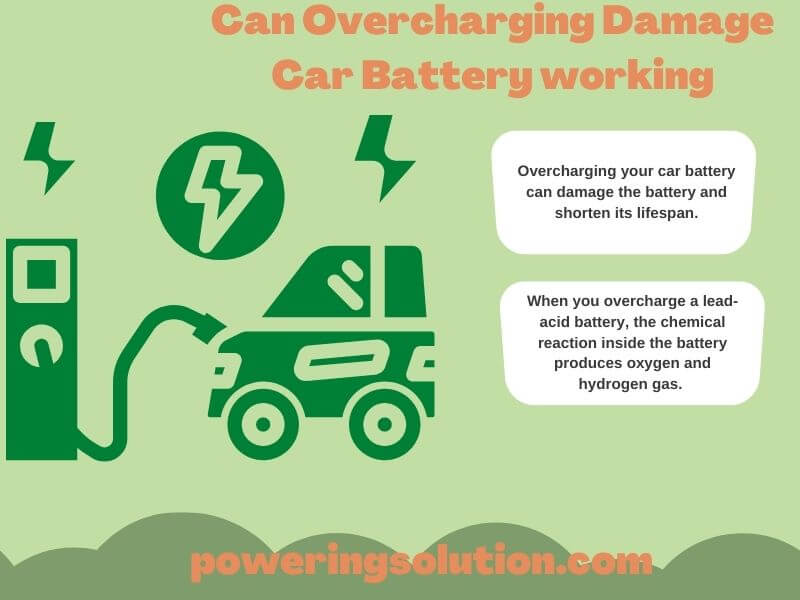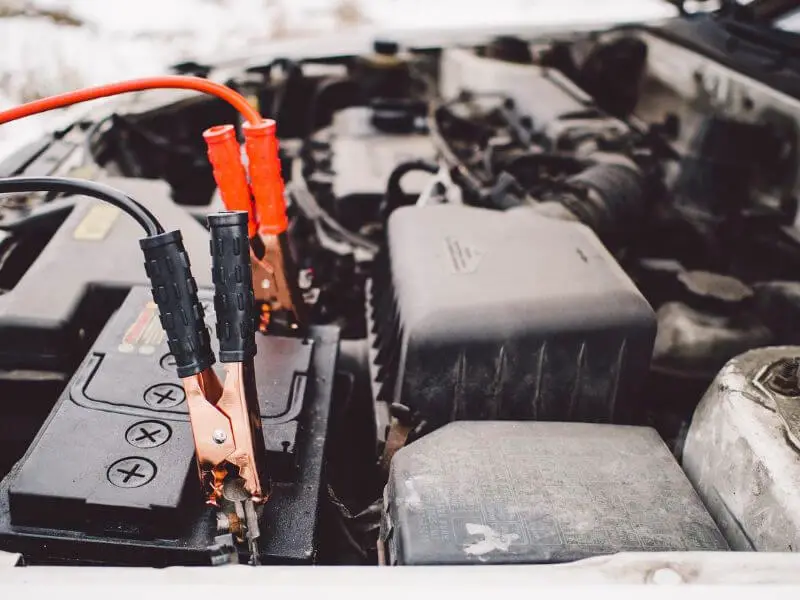Overcharging your car battery can damage the battery and shorten its lifespan. When you overcharge a lead-acid battery, the chemical reaction inside the battery produces oxygen and hydrogen gas. This gas can escape from the battery, causing it to swell and potentially burst.

Overcharging also causes the electrodes inside the battery to break down, which reduces the capacity of the battery and can lead to complete failure.
If you’re like most people, you probably think that it’s impossible to overcharge a car battery. After all, how could something that simple cause so much damage? Unfortunately, it is possible to overcharge a car battery, and it can lead to some serious problems.
When you overcharge a car battery, the electrolyte starts to break down and release hydrogen gas. This gas is highly explosive, and if it builds up too much pressure inside the battery, it can cause the battery to explode. In addition to being dangerous, an exploding battery can also damage your car. A bad battery can cause poor mileage.
Even if the battery doesn’t explode, overcharging can still damage it. The excess electricity will cause the plates inside the battery to warp and degrade. This will shorten the lifespan of the battery and eventually lead to its failure.
So what should you do if you think your car battery might be overcharged? The best thing to do is to take it to a mechanic or auto shop and have them check it out. They’ll be able to tell for sure whether or not the battery is overcharged and they can help you fix the problem before any
Overcharged Car Battery Symptoms
If your car battery is overcharged, you may notice any of the following symptoms:
| Number one | The battery will appear bloated or swollen. |
| Number two | There may be cracks or bulges on the exterior of the battery case |
| Number three | Battery fluid levels may be higher than normal, and the positive battery terminals may be corroded. |
| Number four | The car may not start, or it may experience starting problems. |
| Number five | If the engine does start, it may run erratically or stall frequently. |
How to Fix Overcharged Car Battery?
If you think your car battery has been overcharged, there are a few things you can do to fix it:
First Step
First, check the battery voltage with a voltmeter. If the voltage is above 16 volts, then the battery is most likely overcharged.
Second Step
To fix this, simply disconnect the positive and negative terminals of the battery and let it sit for about 30 minutes. This will allow the overcharged electrons to dissipate and should bring the voltage back down to a normal level.
Final Step
If your voltmeter reading is still above 16 volts after doing this, then you may need to replace your car battery.
An overcharged battery can damage the cells and shorten its lifespan, so it’s best to err on the side of caution and get a new one if needed.
What Causes a Car Battery to Overcharge?
A car battery can overcharge for a number of reasons. The most common cause is incorrect charging by the alternator. Alternators are designed to charge at around 14 volts, but if they’re faulty, they can charge at up to 18 volts.
This higher voltage will damage the battery cells and shorten the battery’s life. Other causes of overcharging include:
- A faulty voltage regulator;
- A problem with the charging system wiring;
Can You Overcharge a Car Battery With a Trickle Charger?
A trickle charger is a great way to keep your car battery charged and ready to go. But can you overcharge a car battery with a trickle charger? The simple answer is yes.
Trickle chargers are designed to slowly charge a battery over time, so if you leave it connected for too long, the battery will become overloaded and could be damaged.
That said, there are ways to avoid overcharging your car battery with a trickle charger:
| Number one | First, make sure you only connect the charger when the engine is off and the battery is cool. |
| Number two | Second, check the charging instructions that came with your charger to see how long it should be left connected. |
| Number three | And finally, if you’re not sure, err on the side of caution and disconnect the charger after 8-10 hours. |
Following these simple tips will help you get the most out of your trickle charger and prevent any damage to your car battery.
Can an Overcharged Battery Be Fixed?
An overcharged battery is one that has been charged to a voltage that is too high for the chemistry of the cells to safely handle. This can happen if you leave your charger connected to the battery for too long, or if you use a charger with too high of a voltage. An overcharged battery will typically show some swelling of the cells and may feel hot to the touch.
If left unchecked, an overcharged battery can catch fire or explode. If you think your battery may be overcharged, it’s important to take action immediately.
The first thing you should do is disconnect the charger and unplug any devices that are plugged into the battery.
Once the charger is disconnected, check the voltage of the battery using a voltmeter. If the voltage is above 4.2 volts per cell, then your battery is overcharged and needs to be dealt with carefully.
There are a few ways to deal with an overcharged battery, but all of them require taking precautions to avoid damaging yourself or your property.
One way to safely discharge an overcharged battery is by connecting it to a resistor load until the voltage drops below 4.2 volts per cell. You can also discharge an overcharged battery by connecting it to other working batteries in series, which will cause current to flow from the overcharge batteries into the good one until they reach equal voltages. Once you’ve discharged your overcharge batteries, you’ll need to recharge them using a low-voltage charger designed specifically for Lithium-ion batteries.
Can You Overcharge a 12 Volt Battery?
A 12-volt battery can be overcharged if the voltage is set too high. This will cause the battery to release hydrogen gas, which can be dangerous. The overcharging will also damage the battery and shorten its life. Keep in mind that most 12V car outlets are rated at between 10 and 20 watts.
Can You Overcharge a Battery?

Batteries are an essential part of our lives, providing power to our electronic devices when we need them most. But what happens when you overcharge a battery? Can it be harmful?
Overcharging a battery can result in the battery becoming damaged and losing its ability to hold a charge. This can happen if the charging process is not monitored carefully, as the battery can become overheated. If this happens, it is important to stop using the device immediately and seek professional help.
In some cases, overcharging a battery can also cause it to catch fire. This is why it is so important to never leave your device unattended while it is charging. If you notice any unusual behavior, such as excessive heat or sparks, unplug the device and move away from it immediately.
If you think your device may have been damaged by overcharging, there are some steps you can take to try and fix it. First, try resetting the device by removing the battery and then replacing it. If that doesn’t work, you may need to replace the entire battery.
In either case, it is always best to consult with a professional before taking any further action.
Is It Ok to Leave a Car Battery Charging Overnight?
It’s perfectly fine to leave a car battery charging overnight. In fact, it’s often the best way to get a full charge on the battery.
However, there are a few things you should keep in mind when doing this:
Use a Specific Charger
Make sure the charger is designed for your specific type of battery. Some chargers are only meant for lead-acid batteries, while others can be used with multiple types of batteries.
Follow Manufacturers Instruction
Follow the manufacturer’s instructions for charging times and voltages. Overcharging a battery can shorten its lifespan or even damage it.
Keep an Eye on the Charger
Keep an eye on the charger and Battery Tender light (if applicable). If either one starts acting erratically, disconnect the charger and take a break until you can troubleshoot the issue.
Don’t Leave the Charger Unattend
Don’t leave the charger unattended for long periods of time. Check on it every few hours to make sure everything is still going smoothly.
Frequently Asked Question
Can a Battery Recover from Overcharging?
Yes, a battery can recover from overcharging. However, it is important to note that this will cause the battery to degrade faster than if it was not overcharged. Additionally, it is possible for the overcharging to damage the battery cells, which can lead to reduced capacity or even complete failure. Overcharging a PS4 controller, for example, may not immediately cause noticeable damage, but over time, it can reduce the overall battery life and lead to shorter play sessions. To avoid this, it’s recommended to unplug the controller once it’s fully charged rather than leaving it connected for extended periods. Taking these precautions can help prevent long-term damage and ensure optimal performance of the battery.
What Happens When a Battery Overcharges?
When a battery overcharges, the excess electricity causes the battery’s cells to break down and release hydrogen gas. This can cause the battery to swell, leak, or even catch fire.
Can You Overcharge a Car Battery at 2 Amps?
It’s 2 am and you’re out of gas. You’re also out of luck if you try to charge your car battery at 2 amps. That’s because most car batteries can only be charged at 1 amp.
Overcharging a car battery at 2 amps can damage the battery and shorten its lifespan.
Final Thought
If you’re like most people, you probably think it’s okay to leave your car battery charging overnight. After all, it’s not like you’re going to forget and let it charge for days on end, right? Wrong.
Overcharging your car battery can actually damage it, and in some cases, even cause it to catch fire. Here’s what happens: when a battery is overcharged, the chemicals inside start to break down and release gasses. These gasses build up pressure inside the battery, which can eventually cause the battery to rupture or even explode.
In addition, the heat generated by the overcharging process can damage sensitive electronic components inside the battery, making it less effective and shorter-lived. So what should you do if you need to charge your car battery? Follow the instructions on your charger carefully, and don’t leave it plugged in for longer than necessary.
If possible, charge your battery during the day so that you can keep an eye on it; if you must charge it overnight, unplug it as soon as possible in the morning.
Relevant Resources:
